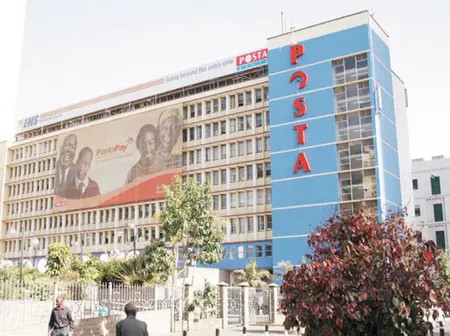Posta Kenya has partnered with Guaranty Trust Bank (Kenya) to launch 46 GTExpress outlets across the country, giving Kenyans faster and cheaper access to banking services right at their local Posta offices.
Through this partnership, GTExpress outlets are now operational in key regions, including Nairobi, Kisumu, Mombasa, Kisii, Nyeri, Nakuru, Nanyuki, and other bordering Posta Kenya outlets.
The service bridges accessibility gaps by offering customers reliable banking services within Posta Kenya Outlets, providing a seamless alternative to traditional branch banking.
Through GTExpress, customers can now conveniently access a variety of services, such as cash withdrawal, cash deposit using a simple USSD code, with transactions processed securely in real time, as well as digital submission of account opening details.
The platform is designed to be user-friendly, reliable, and affordable, with withdrawal transaction costs set below prevailing market rates.
GTBank Kenya MD Jubril Adeniji said the partnership will bring banking closer to everyday Kenyans. “Our priority is to make banking easier and more accessible for our customers, wherever they are. Through GTExpress, someone in Kisii, Nanyuki, or Kitengela can walk into a Posta outlet and carry out their transactions quickly, safely, and at a fair cost,” he remarked.
Adding “At the same time, this rollout is part of a bigger vision to create a nationwide network of secure, affordable, and innovative banking touchpoints that bring us closer to achieving true financial inclusion in Kenya.”
Following this milestone, GTBank Kenya will move into phase two of the GTExpress expansion, with plans to introduce an additional 54 locations across the country.
This next phase will bring the total number of outlets to 100 by the end of 2025, further advancing the Bank’s mission to provide affordable, secure, and innovative financial services to Kenyans in both urban and rural communities.
For a full list of active GTExpress outlets, please visit: https://www.gtbank.co.ke/personal-banking/ways-to-bank/gtexpress
Once a dominant player in Kenya’s communication space, the Postal Corporation of Kenya (Posta) is facing a sharp downturn, hence making this partnership all the more vital to its survival.
The rise of mobile and internet-based communication has rendered Posta’s traditional mail services less relevant. In just one year, domestic letter volumes dropped by nearly 90% — from 1.42 million in April–June 2024 to only 145,627 in January–March 2025. The numbers highlight the deep operational and structural struggles weighing down the state-owned parastatal.
Private courier companies, on the other hand, are thriving. Their domestic letter volumes more than doubled from 415,818 in April–June 2024 to 962,411 in July–September, before easing to 764,948 in the latest quarter. Even with the dip, couriers still processed over five times the volume of letters handled by Posta.
The steep drop in Posta’s mail volumes highlights how outdated the traditional post office model has become in the digital era. With e-commerce, real-time logistics, and instant communication reshaping the sector, private couriers have adapted quickly through tech-driven platforms and efficient last-mile delivery, while Posta remains weighed down by bureaucracy and underinvestment.
Key challenges facing Posta include slow adoption of digital tools, ageing infrastructure, underused branch networks, operational inefficiencies, and stiff competition from more agile private players.
Some of Posta’s recent decisions have further fueled criticism. In July 2024, the corporation drastically increased charges for its MPost virtual postal boxes — from Ksh 400 to Ksh 9,450 for corporate users and to Ksh 2,000 for individuals. That represented hikes of 2,200% and 400% respectively. While Posta defended the move as necessary for restructuring and digitisation, the sharp increase has raised questions over affordability and accessibility.
MPost, which allows users to turn their mobile numbers into virtual postal addresses, was initially seen as a step toward modernising mail delivery. However, the new fees threatened to push away users, particularly small businesses and rural customers who rely on affordable services.
Posta also shifted all its payments to the government’s e-Citizen platform, part of a broader effort to centralise state transactions. While this move was meant to improve transparency and accountability, critics argued it added yet another bureaucratic hurdle for users.
As private couriers continue to expand by leveraging technology and offering reliable services, Posta’s struggle to modernise raises doubts about its long-term relevance in Kenya’s rapidly evolving communication and logistics landscape.

Leave a Reply